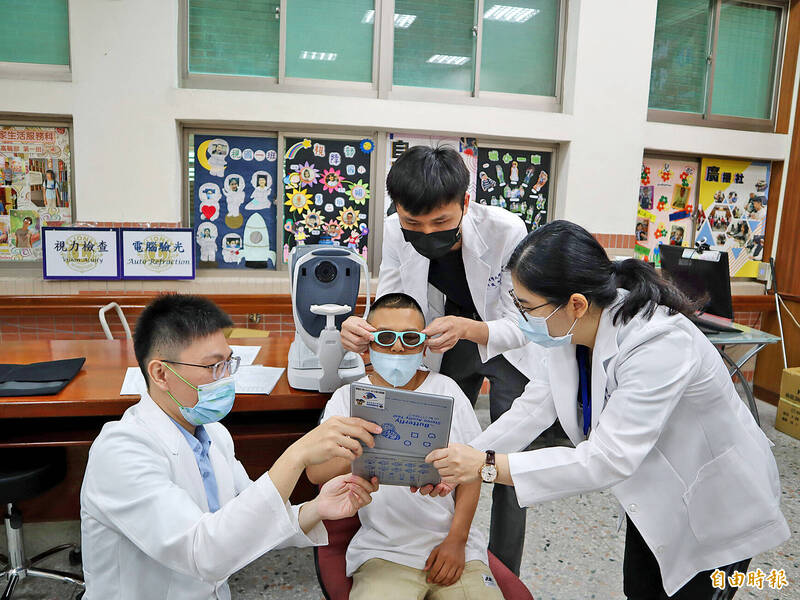《TAIPEI TIMES》 Taiwan winning the battle against myopia, report says

Optometrists perform an eye exam at a school in Taichung on June 5 last year. Photo: Ou Su-mei, Taipei Times
By Lin Chih-yi and Jake Chung / Staff reporter, with staff writer
Diagnoses of nearsightedness in Taiwan have been increasing at a far slower rate than in its neighbors, thanks to a public health initiative to get children to spend more time outside, a feature carried by the international journal Nature said on Wednesday.
The article cited Taiwan’s 2010 policy of “120 Every Day” as the reason for the nation’s relatively low increase in myopia during the COVID-19 pandemic.
The necessity of staying indoors during the pandemic resulted in children in East Asia growing exponentially nearsighted, especially in Shandong, Shanghai and Hong Kong, it said.
There were fewer new cases of myopia among Taiwanese children, it added.
Chang Gung Hospital Kaohsiung branch ophthalmologist Wu Pei-chang (吳佩昌), who was also cited in the article, said that the “120 Every Day” policy encouraged children to exercise outdoors for at least two hours every day.
The government has continued to promote the view that myopia is an illness, and like other illnesses, it should be cured, Wu said.
The efforts have gradually corrected parents’ opinion that worsening myopia was a normal physiological phenomenon, making them more willing to take children for treatment, Wu said.
Wu said the Ministry of Education’s encouragement for students to step outside the classroom during recesses has also helped reduce myopia.
However, Wu also voiced concern that the ministry’s other policies of every student having a tablet computer and installing air-conditioners in every classroom would decrease students’ willingness to go outside.
“The government will have to expend greater efforts to encourage students to step outside the classroom during recesses,” he said.
Wu said such measures would help control myopia among children, ensure that children generate vitamin D from regular sun exposure and introduce opportunities for social interaction among students.
Turning off air-conditioners and lights would also help save energy, he added.
Taiwan’s achievements in controlling myopia have accomplished what no WHO member nation has done, Wu said, adding that he hoped to share Taiwan’s success with others and that the government would continue to introduce effective public health policies.
However, the Nature report also cited Australian National University myopia researcher Ian Morgan, who said that when it comes to promoting more outdoor time, “wide-scale implementation now seems feasible and likely to succeed” only if more governments were willing to recalibrate their education agendas.
Until then, however, Taiwan has been an exception, the article said.
The article also said researchers do not fully know why outdoor exposure helps prevent myopia and that a firmer understanding would help scientists develop better treatments.
The article cited Christine Wildsoet, an optometrist at the University of California, Berkeley, as saying: “Because once we know the key features, then we can bring some of them indoors.”
新聞來源:TAIPEI TIMES











